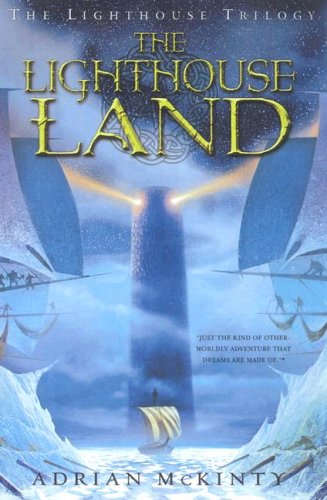
Author: Adrian McKinty
Publisher: Amulet Books, Harry N. Abrams
Copyright: 2006
Genre: YA Science Fiction
This book is about Jamie, a boy with many problems, who moves to a small island off Ireland and discovers a contraption that sends him across galaxies to another planet, where he has to help the inhabitants survive an attack by their barbarian neighbors.
I liked how the initial concept of the transportation device is based on ancient Irish myths, and Irish history is incorporated into the backstory. But on the whole, I was quite disappointed with the book.
The most jarring part, which forced me to stop, take myself out of the story, and re-read passages time after time is the author's constant use of fragments. Now, I know that there's a rule about breaking rules, and that is that you need to know the rules before you are allowed to break them consciously. McKinty, though, uses fragments in ways and places that don't make much sense and leave the reader hanging, waiting for the completion of the thought.
The actual story itself is lacking a bit also. The first few chapters are simply backstory, which has no real impact on the "meat" of the story, the adventure on another planet. The science fiction part of it is marginalized, and the way the contraption works is explained very simply and quickly. In fact, most things that need explanation are explained quickly, usually by Ramsay, Jamie's new friend in Ireland. The inclusion of exposition as events unfold is not at all subtle and is just stated outright. The rule of "show, don't tell" is violated many times. The development of the relationship between Jamie and Wishaway, the alien girl, happens within one paragraph! That whole storyline is filled with cliches, and I found the whole thing awkward. I found that there are some contradictions in the telling and showing of the story as well. For example, the author states in the narrative that Jamie is the leader, the natural leader. But in fact, in the actual events, Ramsay is the one coming up with ideas, giving orders, and generally doing the leading!
The constant switch of points of view is also quite confusing. On one page, the point of view can switch between Jamie, Ramsay, Wishaway, and Callaway with no warning or indication of the change. Although of course it is possible to tell a story using multiple points of view, there has to be a reason to switch and the reader has to be notified when a change is coming, neither of which requirements this book fulfills.
On the whole, I got the feeling that this book is actually still in the manuscript stage and needs a couple more rewrites to improve it. This is the first book of a trilogy, and I'm not going to be reading the next two books.
I haven't heard of this one before, maybe I'll never pick it up...
ReplyDeleteEsther
ReplyDeleteI'm not sure how old you are, but The Lighthouse Land is supposed to be a little challenging for readers. If you like novels where its all about the meat of the story then you should definitely avoid parts 2 and 3: there too, I focus on the words and the sentences not just on story, story, story. I'm actually glad you reread parts of the book, I hate novels where the only intention is to make the reader rush through to the end.
As for your other issues: yes Jamie is supposed to be conflicted about his "leadership". Its intentional. And the science behind the jump hate is not alas explained until book 3 which it is clear you will never read. Oh well.
The Lighthouse Land has won several awards and has been nominated for several others. I have also received hundreds of letters from children who enjoyed the book, so clearly some people at least are glad that it made it out of manuscript. But I agree with you, you should definitely avoid parts 2 and 3 and perhaps in the future stick with books more squarely within your comfort zone.
Best,
Adrian McKinty
Hi Adrian,
ReplyDeleteThanks for your comment. I'm 22, and I approached this book as a young adult book, which I think it is the age group it fits most.
I did notice that you also wrote adult novels, and I'm thinking about checking those out. I know that some authors' styles change when they're aiming at different age groups.
Esther
ReplyDeleteA word of warning before you read the adult books: they are pretty violent crime and mystery novels usually in the noir genre. They are definitely NOT for everyone.
Best
Adrian..